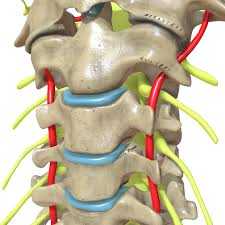
Veterans suffer a variety of different injuries and disabilities related to service. One of the more common areas where injuries occur is the back. Veterans are often required to carry and move heavy materials, which can place a large amount of strain on their back. If you developed a bulging disc due to your time in the military, you’re entitled to disability compensation.
If you suffered an injury in service that led to your spinal problems, you can receive bulging disc VA disability compensation.
To understand what a bulging disc is, you must first know the anatomy of the spine. In essence, the spine consists of bones (vertebrae), discs in between the bones that absorb shock, and a bundle of nerves that run the length of your spine (spinal cord). A bulging disc is an injury to the discs in between your vertebrae (the bones in your spine). These discs are composed of both an interior nucleus pulposus and exterior annulus fibrosus.
When a Veteran is suffering from a bulging disc, the interior nucleus pulposus protrudes from the exterior annulus fibrosus. According to Harvey Smith, physician and orthopedic surgeon at the Pennsylvania VA Medical Center, “A bulging disc is like letting air out of a car tire. The disc sags and looks like it is bulging outward.” However, this is a little different than a herniated disc, which occurs when there is a tear or hole in the annulus fibrosus.
Bulging discs are considered degenerative, meaning there is often a gradual onset of symptoms. The most common reason a person develops this degenerative disc disease is due to degeneration related to age. However, Veterans can also develop a bulging disc due to trauma to the neck or back.
According to the Illinois Bone & Joint Institute (IBJI), a variety of injuries could cause a bulging disc, including:
While most Veterans have unique working conditions based on their specific MOS, most place pressure on their back, whether that is from poor posture or lifting heavy equipment. By understanding the continuous strain Veterans place on their back throughout military service, it is easy to see how a Veteran could develop a bulging disc.
Bulging discs are often accompanied by serious symptoms. The Illinois Bone & Joint Institute notes that individuals with a bulging disc may experience:
Common treatment for bulging discs include rest, physical therapy, exercise, and medication.
For a Veteran to receive VA disability for bulging discs, they must first prove service connection. Basically, they need to show the VA that the bulging disc was caused by military service. There are two ways a Veteran can get service connection, on a primary and secondary basis.
For a Veteran to receive service connection on a primary basis, they must prove three elements. The Veteran must:
If a Veteran can prove all three elements, they can receive bulging disc VA disability compensation.
Veterans can also receive service connection on a secondary basis. Secondary service connection is common in VA claims and could be vital to getting you the correct VA disability rating. A secondary condition is an injury or disability wasn’t directly caused by your time in the military but was instead caused by another service-connected condition.
For example, let’s say you suffered a leg injury in service. You filed a claim for your leg injury and were granted service connection. Your leg injury, however, caused you to have poor posture and eventually led to bulging discs. Now, you can file a claim for bulging discs secondary to your leg injury.
The VA often rates musculoskeletal injuries based on the limitation to range of motion. In the case of bulging discs, the VA examiner will likely look at how far you can bend your back.
Bulging discs are rated based on the number of incapacitating episodes that have occurred due to the disability. For example, if a Veteran experienced 4-6 weeks of incapacitating episodes in the past year, they can receive a 40% bulging disc VA disability rating.
Berry Law fights for fellow Veterans who were denied disability benefits or given a low rating. If you applied for VA disability for bulging discs but were denied, you have the right to appeal. Berry Law has helped thousands of Veterans successfully appeal unfavorable VA decisions. Contact Berry Law’s team of Veterans today to receive a free case evaluation.
Our monthly newsletter features about important and up-to-date veterans' law news, keeping you informed about the changes that matter.